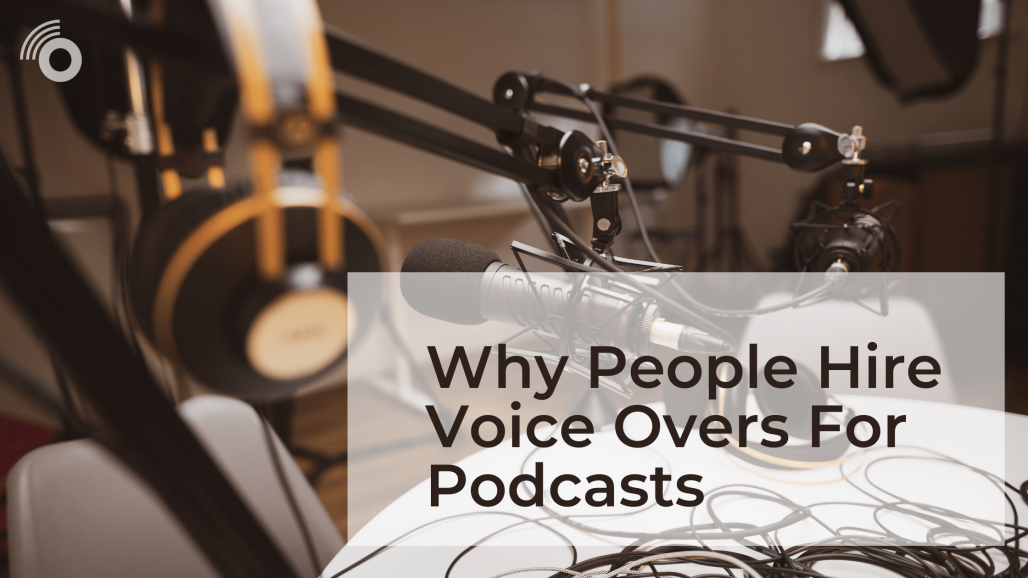Learn how to choose the best artist to record voice-over for podcast intros and outros and why profe...
Why People Hire Voice Overs For Podcasts

Podcasts are becoming increasingly popular, in large part due to their convenience. One of the main reasons they’ve been consistently on the rise is that they allow for (and even promote!) multitasking. People can listen to podcasts while doing something else like running, cooking, commuting, or cleaning. This is actually how they are designed to work.
During the last few years, we have seen the emergence of thousands of new podcasts, covering anything from gardening and true crime to history and investment. Not only are they very cost-effective (they don’t need fancy visuals or big investments), they are also a great way to build credibility and easily connect with your audience. Podcasts have given many creators a realistic goal - and a bridge to create intimacy with their listeners.
Successful podcasts require quality content. However, they also rely almost entirely on audio, which means that the voices supporting the script need to be engaging. They need to be able to connect with the audience in an authentic, meaningful way. But what makes a podcast voice over perfect?
Why voice matters in audio
There are several factors that can help a podcast become successful. Of course, the quality of the content is an essential part. However, podcasts thrive primarily on creating a connection with their listeners - and this is where many creators choose to place their focus.
Different series will have different requirements. This shouldn’t sound too unfamiliar: Hollywood trailers tend to use deep voices, while we can frequently find more enthusiastic commentators for sports. So what does a podcast voice sound like?
It’s generally agreed that the best podcast voice is a natural-sounding one. The ideal tone is conversational and authentic. What’s important is to reach the right balance between sounding fresh and natural, and being able to enunciate.
Podcast voices should also be able to convey a range of emotions. For example, enthusiasm, sadness, excitement, or sorrow - depending, of course, on the script. This is where the voice over artist style matters. Emotions communicate best, but knowing how to convey each one more “naturally” and on demand is no easy task.
People tend to prepare somewhat of a relationship with creators - and, in many cases, entire communities are built around podcasts. Every person, every industry has a story to tell. So how can you find the perfect voice to do it?
The challenges of doing your own voiceover
One of the biggest marks of a great voice is the ability to be personable. Our favorite hosts are not perfect, they are authentic. However, many of us don’t realize that we have habits that are less than ideal for podcasting. For example, we use too many fillers in the same sentence or clutter too many words.
Although we all have a signature voice, one that accompanies us since the beginning of our life, that voice changes or adapts depending on the circumstances. Many times, being a reader is more about taking the words that are written on a page and turning them into your own. For some people, the first step towards doing the voice for their podcast or becoming a voice actor is to train. They might choose to hire coaches to help them with vocal and diction exercises, and practise several different methods and rhythms. And it might take them a few episodes to find the perfect tone.
For many others, however, it’s easier and safer to hire a voice over artist who specializes in podcasting and will get things running from the get-go. This is a great option if you don’t have time to train or you want one or more specific voices to represent your brand.
Finding the right voiceover artist
The perfect podcast voice over talent will be able to provide a combination of confidence, knowledge, and the right talking speed. When making the choice to hire a voice actor or commentator, the majority of creators will look for someone who has training in breathing, enunciation, and delivery of emotions. These characteristics will help form a voice profile - one that listeners will learn to associate with your podcast.
If you think you can benefit from the help of a professional voice over artist, a good first step is to describe this desired voice to avoid ambiguity. For example, whether you want the voice to sound young, to show a certain level of energy, or to use a particular accent. Even after you send an actor a script, they might not record all lines in the same style and tone you had in mind. This is why it’s best to provide detailed feedback so they can send new and improved audio files to get the perfect result.
There are several online agencies where you can access a pool of professional voice actors. With OutSpoken you can easily request high quality demos and book voice over artists in just minutes. We work with a diverse and artistic range of voices with home studios all over the globe. Whatever style you have in mind for your podcast, reach out to our friendly team and let’s find your perfect voice!
Newsletter
Stay up to date with news and special offers. Get to know our new actors and features
NEED HELP?
Visit Frequently Asked Questions page or send us a question.











.png)







Comment